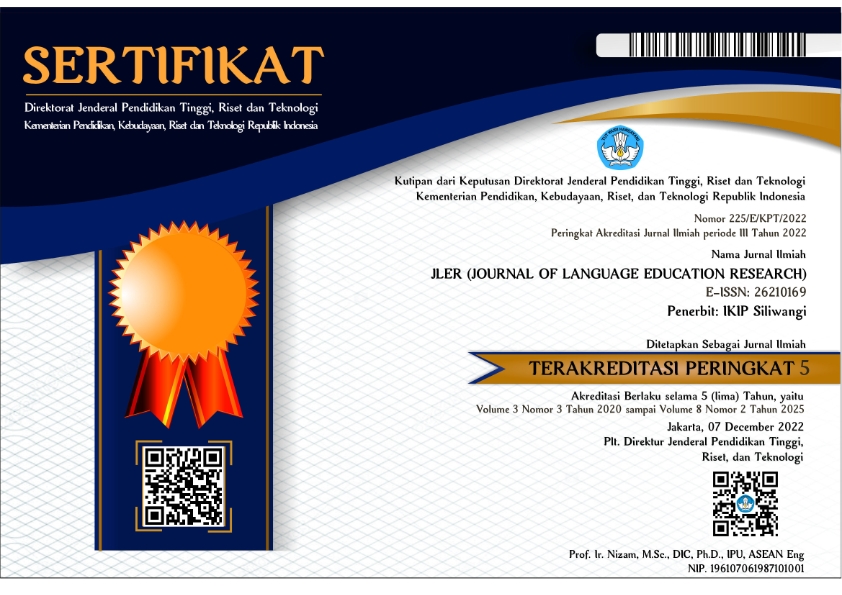ABILITIES OF CLASS IX STUDENTS MTs.N IN WRITING CRITICAL RESPONSE TEXT THROUGH CONTEXTUAL LEARNING ( CTL )
DOI:
https://doi.org/10.22460/jler.v4i3.6538Keywords:
Keywords, writing skills, critical response text, contextual learning (CTL)Abstract
The need for mutual interaction between people in the middle of life causes the need for students as a generation to be able to communicate all the contents of their ideas and thoughts, both orally and in writing in effective language. This study directs students to be able to express their ideas and ideas through writing products of critical response text that students have learned in class IX MTs./SMP. This study involved the dependent variable (critical response text) and the independent variable (contextual learning / CTL). The research is based on the researcher's knowledge of several studies which state that contextual learning is very fun and gives students freedom in thinking patterns to decide on a phenomenon, and can even improve writing skills. This study aims to describe the skill level of students of class IX MTs.N 5 West Bandung in writing critical response texts through contextual learning (CTL). This study used a pretest and posttest design with two types of instruments, namely the observation sheet and the test sheet. The method used is an experiment with a sample of 25 class IX students. Existing data processing includes grading / scoring, grouping, calculation, and others. The results showed that the teaching and learning process of the students' skills abilities of class IX MTs.5 West Bandung in writing critical response texts through contextual learning (CTL) went well and smoothly, succeeded in accordance with the basic competencies in the syllabus. Students are more enthusiastic and the learning atmosphere becomes more active, interactive, not monotonous, and students are more free to express their ideas and thinking according to their respective abilities. Student scores also seem to have increased significantly between before and after going through the contextual learning process (CTL). ). The processed data shows that the initial test score is 59.6 and the final test score is 80.6. Meanwhile, the ability to write critical response text through the lecture method shows the initial test results of 57.1 and the final test of 72.8. Teachers and students are more intimately engaged and the learning atmosphere is more comfortable and relaxed. This is evident from the overall percentage, that 93% of students follow learning well and 7% of students do not follow learning well.Â
References
Arifin, Z. (2013). Evaluation of learning. Bandung: Rosda Karya.
Arikunto, S. (2002). Research Procedure, A Practice Approach . Jakarta: PT. Asdi Mahayatsa.
Keraf, G. (2006). Diction and Language Style . Jakarta: PT Gramedia Putaka Utama.
Huda. (2014). Teaching and learning models . Yogyakarta: Learning Library .
Harefa, A. (2007). Engrave Words, Arrange Sentences . Yogyakarta: Gradient Books
Hariningsih, D. et al. (2008). Opening the Window of Science in Indonesian SMP/Mts Class IX. Jakarta: Bookkeeping Center of the National Education Department.
Jhonson, E. B. (2010) . CTL (Contextual Teaching and Learning): Making Activities Belajar-Mengajar Entertaining Learning and Meaningful. Bandung: Kaifa Learning.
Purnamasari, N. (2015). Thesis (Improvement of Narrative Writing Skills). Yogyakkarta: PGSD Study Program Jur. Pend. Preschool and SD, Faculty of Science Education.
Riyanto, A. (2010). Data processing and analysis . Yogyakarta: Nuhamedika.
Sanjaya, V. (2006). Educational Process Standards Oriented Learning Strategy. Jakarta: Golden.
Sugiono. (2012). Qualitative quantitative research methods and R&D. Bandung: Alfabeta.
Suharma, dkk. (2010). Indonesian language and literature class IX SMP. Bogor: Yudhistira.
Suryaman and Ismail. (2006). Journal of Indonesian language and literature education . Bandung: Office of the Department of Indonesian Language and Literature Education FPBS, UPI.
Syamsuddin, AR. (2011). Language education research methods . Bandung: Rosda .
Trianto. (2010). Design innovative learning models . Jakarta: Rineka Cipta.











